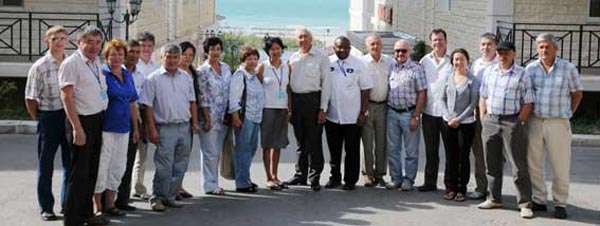In the Republic of Kazakhstan, general breeding programs are funded by the Ministry of Agriculture, whilst those relating to biotechnology are funded through the Ministry of Education and Science. The use of biotechnology within plant breeding is a complex issue, and genetic and physiological studies within national breeding programs are often limited. To help develop a national strategy for the use of plant genetic resources for food and agriculture in Kazakhstan and foster relevant collaboration between the country’s biotechnology and agricultural crop research organizations, CIMMYT-Kazakhstan staff organized a training seminar on modern trends and methods for plant breeding and seed production during 15-19 August 2011. The event drew scientists and experts from Kazakhstani breeding programs, the Kazakhstan-Siberia Network on Spring Wheat Improvement (KASIB), and national research and educational organizations.

Representing FAO, Chikelu Mba delivered a presentation highlighting food security issues. He argued that if food production is to increase by the necessary 70% within the next 40 years, we must use not only conventional plant breeding, but also increase experimental mutagenesis (chemical and physical), use of in vitro tissue culture, cell selection, technologies based on haploidy and somaclonal variability, molecular markers, and DNA recombinations. Mba also drew attention to the new FAO program, “Global Partnership Initiative for Plant Breeding Capacity Building” (GIPB), which aims to improve food security and sustainable development within developing countries through improved crop breeding.
The current challenges of plant breeding in Kazakhstan and central Asia were addressed in a presentation by R. Urazaliev. Presently, projects are focused on breeding new varieties and improving wheat cultivars, increasing yield, improving quality, decreasing the share of by-products, and reducing losses from pests and diseases. V.P. Shamanin, Professor at Omsk Agricultural University, also spoke of the economic importance of wheat and the current issues and trends related to crop breeding. Emphasis was given to adaptive breeding and breeding for resistance to environmental stresses, and Shamanin also described the seed production and distribution systems in Russia and other developed countries. The focus was not only on wheat however, as Carlo Carli from the International Potato Center, Peru, also emphasized how these issues are also relevant to potato crops worldwide, and also how biotechnology is currently being applied to improve the yield of potatoes and raise their nutritional value.
V. Syukov (Samara, Russia) gave a presentation on the genetic basis of plant breeding, and also described how physiological and genetic approaches are being applied to breeding at the Samara Agricultural Research Institute. The speakers emphasized that development and implementation of multi-disciplinary projects should be prioritized, in addition to building capacity within breeding, biotechnology, and genetic resources, and promoting training seminars featuring international expertise.
In concluding the seminar, participants agreed that several measures should be taken at the national level to develop breeding and seed production; including expanding current research methods through modern applied methods, biotechnology, and active utilization of artificial climate techniques; use of ICTs in the breeding process; improvement of state testing of varieties with expedited testing procedures; introduction of efficient variety replacement and seed farming systems; and further training of specialists and increased international collaboration. With respect to Kazakhstan, participants felt that the legislative and regulatory framework governing breeding, seed growing, and PGR should be improved; a National Gene Bank should be created, with Kazakhstan joining the International Union for the Protection of New Varieties of Plants and the International Seed Testing Association; and the National Strategy on Plant Genetic Resources for Food and Agriculture must be developed and approved.
Participants felt that the seminar was important in addressing Kazakhstan’s agricultural issues, and thanked the FAO and CIMMYT-Kazakhstan for organizing and coordinating the activities.

